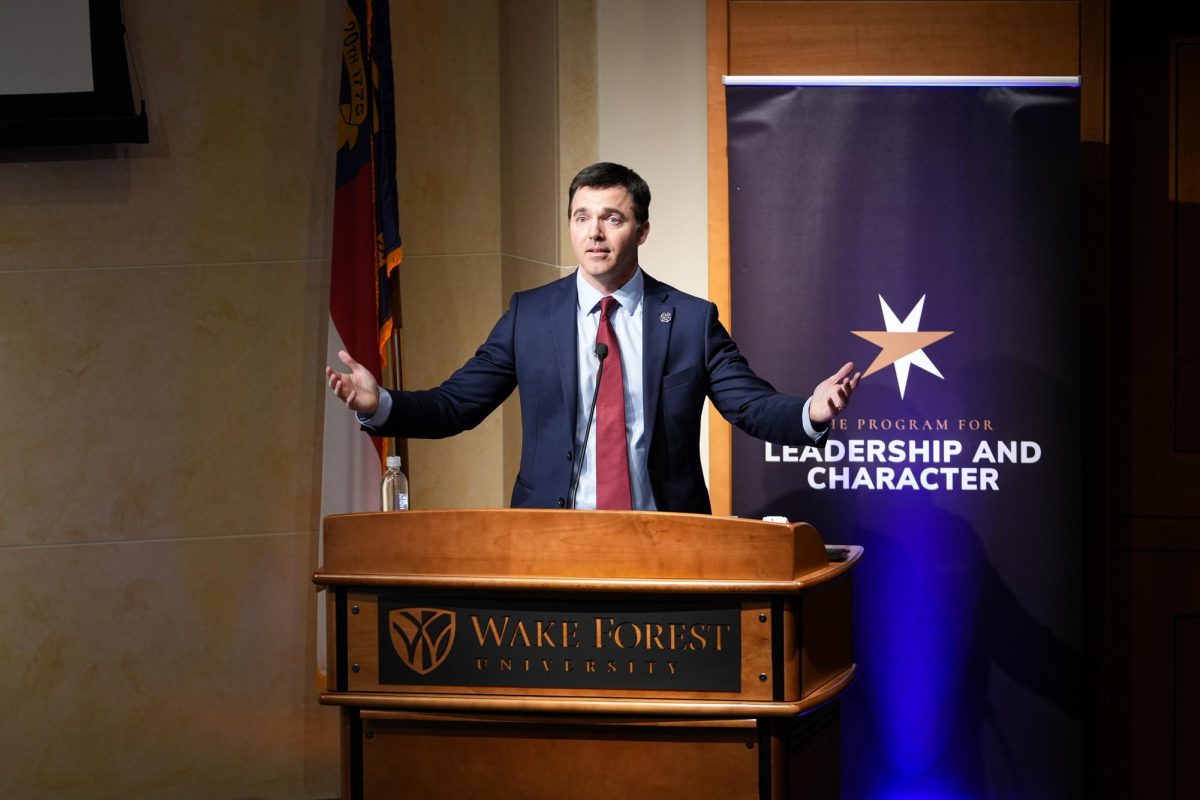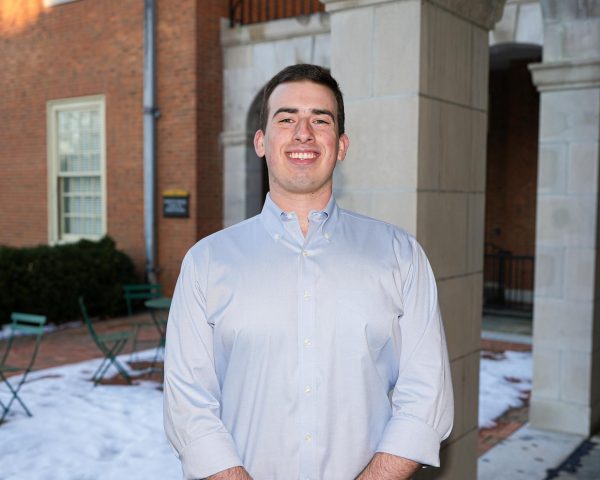North Carolina Attorney General Jeff Jackson spoke candidly about his short time as the state’s top prosecutor. After serving just three months in statewide office, he said he does not have it all figured out and often relies on his character to show him the way.
This honesty is just one trait of leadership that Jackson shared with students and scholars at Wake Forest University’s inaugural Leadership and Character in the Law Conference. In his keynote address, Jackson provided aspiring leaders with advice for delivering meaningful change, finding their purpose, and realizing their full potential.
Jackson kicked off the symposium in Farrell Hall hosted by Wake Forest’s Program for Leadership and Character. According to the event’s website, the two-day conference on March 27 and 28 convened law scholars and students from around the country “to share common concerns as well as to develop ideas for developing lawyers of integrity.” The event also featured remarks from more state leaders, including North Carolina Supreme Court Justice Phil Berger, Jr. and former Justice Michael Morgan.
Jackson, 42, brought a great wealth of leadership insight to the event. Before being elected to statewide office in 2024, he served as a Charlotte-area state senator, briefly ran a U.S. Senate campaign and was a member of Congress for one term. As a member of Congress, Jackson gained popularity on social media, surpassing 2.2 million Tik Tok followers and another nearly seven-hundred thousand on Instagram.
However, Jackson said leading a large organization like the North Carolina Department of Justice reminds him most of his time in the U.S. Army. Like the armed forces, Jackson supports his organization’s selfless, “mission-driven” employees to help the people of North Carolina, often for little reward of their own. As a leader, he said it is important to take a step back and recognize his team’s accomplishments to avoid burnout and make sure people stay motivated.
“One of the things mission-driven people tend not to do is celebrate their wins,” Jackson said. “All of the leaders [at the justice department], we have to do a very good job of making sure we pause to celebrate.”
Jackson also said it is his job to build quality partnerships with the other people and organizations who can give his department what it needs to achieve their goals. This means constructing sincere, trustworthy relationships with local, state, and federal officials that can support their missions around North Carolina.
Caleb Pembele, president of the Wake Forest College Democrats, appreciated Jackon’s efforts to connect with local North Carolina communities.
“Attorney General Jeff Jackson’s address was insightful, and I took many lessons from it that I will use in my life,” Pembele said. “His remarks further confirmed that he is up to the task of Attorney General and will do his job ethically and effectively.”
Whether tackling the “third wave” of the prescription drug crisis with fellow attorneys general or recruiting federal law enforcement agencies to protect Western North Carolina’s reconstruction in the wake of Hurricane Helene, he says honesty has already helped him to affect real, impactful change since taking office in January.
“I make it as easy for them to say yes as possible because that conversation [with attorneys general] is not really about fentanyl,” Jackson said. “That’s the text. The subtext is ‘Is this person trustworthy?’”
Jackson eventually leveraged the trust he built by talking to students and appealed to their character. Sitting down for a moderated question-and-answer session with Associate Dean for Experiential Learning and Director of the Medical-Legal Partnership (MLP) Clinic Allyson Gold, Jackson argued that forces like partisanship and publicity are poor incentives for public officials, who, he says, the public just want to see do the job well.
“No matter how good a job I end up doing on this, there’s a limit to the number of people who are going to follow anything that I do,” he said. “The motivation is just to do the right thing. If your motivation is ‘I want everyone to see what I’m doing all the time,’ you are going to fail.”
Jackson implored students to consider the merits of a career in public service. He explained how students could discover their personal reason or mission and make their own change in their community. He recognized the reasons people might shy away from a career in public service – the tense political moment or bureaucracy’s lesser benefits – before asking students to reconsider if they’re embarking on their life’s path for the right reasons.
“[Young people] really want the car. They really want the house. I get that,” Jackson said. “But if you’re willing to step out of that and let your own character and your own inclination be your guide, it’s so deeply rewarding. It’s the type of decision very few people end up regretting.”









